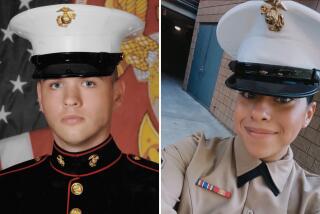No ‘bad guys’ amid the 19 bodies
- Share via
CAMP PENDLETON — The officer who gave the order that led to Marines killing 19 unarmed Iraqis in their Haditha homes testified Monday that none of his troops had positively identified the houses as containing insurgents before he ordered them “cleared.”
1st Lt. William Kallop said he still believed his Marines acted properly because they later told him of hearing the distinctive “metal on metal” sound of AK-47s being prepared to fire in the first house and then took fire from the second house. Kallop said that two Marines told him that they began throwing fragmentation grenades after hearing AK-47s.
But Kallop, testifying in a preliminary hearing of the ex-commander of the troops’ battalion, said he inspected the houses later and found no AK-47s, no shells or other evidence that insurgents had been inside.
“I looked at Cpl. [Hector] Salinas and said: ‘What the crap? Where are the bad guys?’ He looked as surprised as I was,” Kallop said in videotaped testimony.
Kallop, who has since returned to Iraq, was given immunity to force him to testify in what has become the largest case of alleged abuse of civilians levied against U.S. forces in Iraq. In all, 24 Iraqis, including women and children, were killed in Haditha on Nov. 19, 2005.
Kallop testified that Staff Sgt. Frank D. Wuterich, the squad leader who led the assault, did not tell him that the Marines fired their M-16s and threw grenades while inside the houses. A report by Naval Criminal Investigative Service agents said many of the Iraqis were shot in the head, some at such close range that their bodies had powder marks.
Kallop’s testimony came on the fourth day of the hearing for Lt. Col. Jeffrey Chessani, who was commander of 3rd Battalion, 1st Regiment, on the day of the deaths.
Chessani, 1st Lt. Andrew A. Grayson, Capt. Lucas M. McConnell and Capt. Randy W. Stone are charged with dereliction of duty for not investigating the incident as a possible war crime. Grayson headed a team that examined the houses and took pictures; McConnell was the Kilo Company commander; and Stone was the battalion lawyer.
The Marines who assaulted the houses -- Wuterich, Lance Cpl. Justin L. Sharratt and Lance Cpl. Stephen B. Tatum -- are charged with unpremeditated murder. Similar charges were dropped against Sgt. Sanick P. Dela Cruz in exchange for his testimony against the others.
The incident began when a roadside bomb exploded beneath the last Humvee in a resupply convoy. Lance Cpl. Miguel Terrazas was killed instantly and two other Marines were injured.
Moments later five young Iraqi men were ordered out of a nearby car and fatally shot by Marines.
Kallop, a platoon commander, arrived at the scene more than two hours after the explosion that killed Terrazas. He testified that Marines told him of hearing gunfire to the south and north of their location near the wrecked Humvee but that none specifically pointed out the three houses nearly 330 feet away across a vacant field.
“I decided the house was most likely the place where the fire was coming from and told Sgt. Wuterich to ‘clear south,’ ” Kallop said.
He testified that Wuterich told him after assaulting the houses that the occupants in the first house had said insurgents had fled into the second house. Prosecutors alleged that Wuterich’s account was false.
Under questioning by prosecutors, Kallop conceded that he asked few questions at the scene. He did not ask, for example, about the five men in the street, or how civilians were killed in the second house, or whether Marines found any weapons in the houses.
Kallop said his Marines had “cleared” hundreds of houses in preceding weeks without incident. But Terrazas was Kilo Company’s first fatality and Marines were convinced that insurgents had mounted a “coordinated, complex attack,” according to testimony.
A key point in Chessani’s hearing is why his Marines, despite being repeatedly told to use more restraint in Haditha than they did during the major assault on Fallouja in late 2004, reverted almost reflexively to more aggressive tactics.
In Fallouja, civilians had largely fled the city and insurgents were barricaded inside homes, waiting for Marines to burst through doors. Haditha, however, was a densely populated city.
“You can’t use Fallouja-style room-clearing in a place like Haditha,” W. Hays Parks, a Defense Department lawyer and an expert on the laws of war, testified last week.
More to Read
Sign up for Essential California
The most important California stories and recommendations in your inbox every morning.
You may occasionally receive promotional content from the Los Angeles Times.











